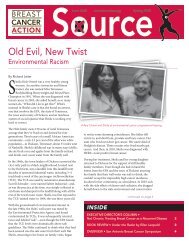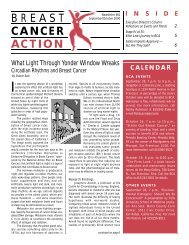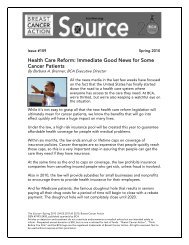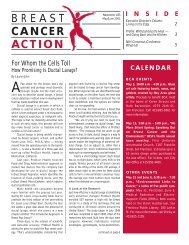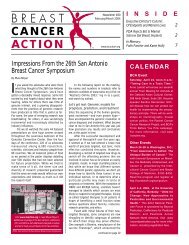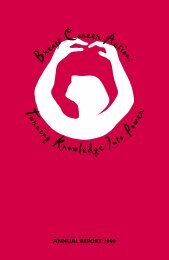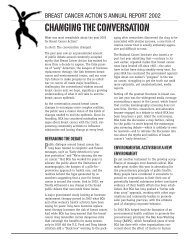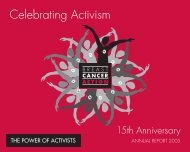BREAST CANCER ACTION - Return to Home Page - Breast Cancer ...
BREAST CANCER ACTION - Return to Home Page - Breast Cancer ...
BREAST CANCER ACTION - Return to Home Page - Breast Cancer ...
You also want an ePaper? Increase the reach of your titles
YUMPU automatically turns print PDFs into web optimized ePapers that Google loves.
4 June/July 2006 <strong>Breast</strong> <strong>Cancer</strong> Action<br />
BCA Board Members…<br />
continued from page 3<br />
communities and others.”<br />
LBCA schedules appointments for<br />
women and accompanies them <strong>to</strong> their<br />
appointments. The group also provides onsite<br />
translation and interpretation services.<br />
“This has made a really big difference for our<br />
women <strong>to</strong> acquire the free screening services.<br />
We have the return rate. [LBCA clients return<br />
time and again.] They call us before we send<br />
out the [reminder] notice <strong>to</strong> them,” Olivia<br />
said. She encourages hospitals and clinics <strong>to</strong><br />
provide cultural sensitivity trainings so that<br />
their staff members understand the cultures of<br />
the patients they’re serving. While that might<br />
seem a small piece in a big,<br />
bad health world, Olivia<br />
pointed out that it makes a<br />
big difference <strong>to</strong> her<br />
community.<br />
Kim Cox:<br />
Making a Difference<br />
Across the Bay<br />
Across the San Francisco<br />
Bay, Kim Cox directed<br />
Contra Costa County’s <strong>Breast</strong> <strong>Cancer</strong> Program<br />
from 1997 <strong>to</strong> 2002. There, she worked with<br />
a coalition of advocates, educa<strong>to</strong>rs, and<br />
medical providers that addressed breast<br />
cancer education, outreach, screening,<br />
diagnosis, and treatment issues for uninsured,<br />
low-income women. She has been a public<br />
health educa<strong>to</strong>r and administra<strong>to</strong>r for over 20<br />
years in both the United States and abroad.<br />
Kim is also an 10-year ovarian cancer survivor<br />
who says, “Any day with hair is a good hair<br />
day.”<br />
She helped create Contra Costa County’s<br />
Alerts by E-mail<br />
patient naviga<strong>to</strong>r program, which also focuses<br />
on community outreach. The program<br />
recruited women from the local community,<br />
trained them, and then employed them <strong>to</strong> talk<br />
about early detection. Spanish-speaking<br />
naviga<strong>to</strong>rs would also go in<strong>to</strong> the exam room<br />
with women and interpret during the visit.<br />
However, this was not always the case<br />
in that county.<br />
“If you spoke English,” Kim said,<br />
“you could go <strong>to</strong> American <strong>Cancer</strong><br />
Society and get a wig. You could go <strong>to</strong><br />
the Wellness Community and get<br />
support services.” But after a situation<br />
went terribly wrong for a Spanishspeaking<br />
patient, the agencies and<br />
Kim’s program realized changes<br />
needed <strong>to</strong> be made. Today, there are<br />
more resources available for Spanish speakers<br />
in the county.<br />
Realizing the importance of tailoring<br />
outreach <strong>to</strong> be appropriate for different<br />
communities, the county also created<br />
culturally tailored programs for the Asian<br />
Pacific Islander community, African American<br />
women, and lesbians. “Hospitals should really<br />
look <strong>to</strong> their community,” Kim said.<br />
Kim is also well-versed in the layers<br />
upon layers of bureaucracy involved with the<br />
various local, state, and federal programs.<br />
Each seems <strong>to</strong> patch part of the problem, one<br />
Want up-<strong>to</strong>-the-minute news, notices, and action alerts on<br />
breast cancer—but hate <strong>to</strong> see your e-mailbox cluttered<br />
with unwanted messages? Sign up for BCA’s monthly e-alert!<br />
The e-alert goes out on the first Wednesday of the month, with<br />
an occasional midmonth update for special events and alerts on<br />
short notice. The e-alerts will also let you know when the newest<br />
issue of the BCA Newsletter has been posted on our web site—<br />
so if you’d prefer <strong>to</strong> download it from the site instead of receiving it<br />
in the mail, contact us at 415/243-9301 or info@bcaction.org. Sign up<br />
for the e-alert online at www.bcaction.org/ealert.<br />
“The health system is a broken one, and patient naviga<strong>to</strong>rs<br />
in local government and private agencies serve <strong>to</strong> fill gaps<br />
that shouldn’t exist.”<br />
facet of the broken<br />
system, but only an<br />
assurance of<br />
universal access <strong>to</strong><br />
care will truly solve<br />
the problem.<br />
Diane Carr:<br />
Devoted <strong>to</strong><br />
Women’s Health<br />
A registered nurse since 1967 and a nurse<br />
practitioner since 1981, Diane Carr has<br />
dedicated her career <strong>to</strong> women’s health. She is<br />
currently the direc<strong>to</strong>r of <strong>Breast</strong> and Cervical<br />
<strong>Cancer</strong> Services for the San Francisco<br />
Department of Public Health and is a member<br />
of the state’s <strong>Breast</strong> and Cervical <strong>Cancer</strong><br />
Advisory Council. Diane has also been<br />
<strong>to</strong>uched by breast cancer in her personal<br />
life—family and friends have had the disease,<br />
including her mother, who died in 1989. She<br />
is particularly proud of her work with the San<br />
Francisco Women’s Health Center/Collective<br />
and the Coalition for the Medical Rights of<br />
Women, which focuses on empowering<br />
women by demanding and advocating for<br />
quality health care for themselves and their<br />
families.<br />
Like many people who work in the<br />
health field, Diane explains that the United<br />
States’s health care system is broken, and that<br />
the naviga<strong>to</strong>rs she oversees help patients<br />
overcome the obstacles inherent in this<br />
system.<br />
Everyone diagnosed with breast cancer at<br />
San Francisco General Hospital (SFGH),<br />
which is overseen by the city’s public health<br />
department, is assigned a patient naviga<strong>to</strong>r <strong>to</strong><br />
make sure that they get the right services and<br />
resources. Because so many languages are<br />
spoken in San Francisco, there are naviga<strong>to</strong>rs<br />
at SFGH who speak Spanish, Can<strong>to</strong>nese,<br />
Russian, and Tagalog. However, this doesn’t<br />
cover every language group. For SFGH’s<br />
Vietnamese-speaking patients, for example, an<br />
continued on page 5



